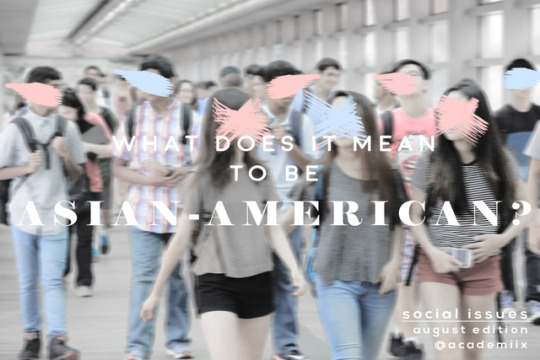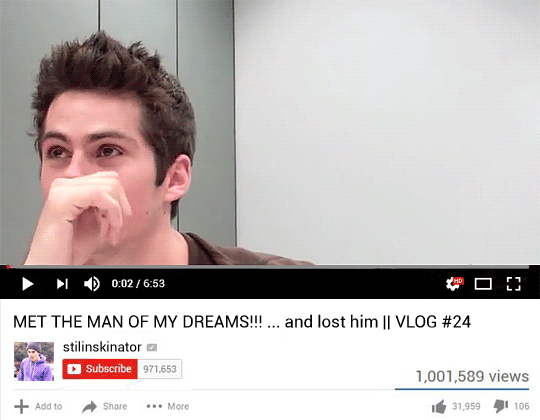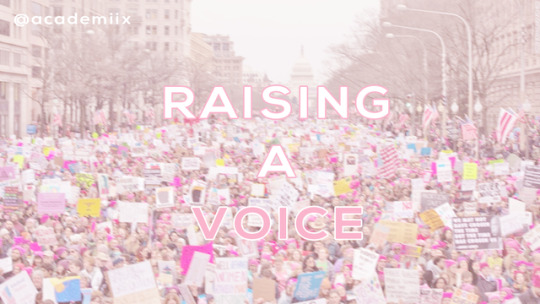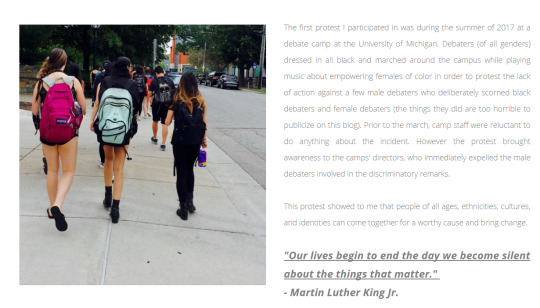#mine:social
Photo

Please read if you show genuine interest and will not leave rude/racist comments
“Growing up, I thought I was white. It didn't occur to me I was Asian-American until I was studying abroad in Denmark and there was a little bit of prejudice.”
―Maya Lin
What does it mean to be Asian-American? is a question I often ask myself in the rare moments of spare time as a teenager still figuring out my identity. It used to just be a passing thought, a small part of myself that I didn’t care too much about. But the more mature I become, the less I can ignore this blatant label plastered onto my face. Everything I did became “Asian-American,” and I learned to embrace this identity, passion surging through my veins every time I heard the hyphenated word.
The first time I truly stopped to search “Asian-American” on Google Images was for a project in freshman year. We had to create a memoir, and I chose to draw a self-portrait, but ran out of ideas how to portray my “Asian-Americaness.” What I found was typical - the picture-perfect family, a few pictures of the legendary show Fresh Off the Boat, countless students with graduation caps and gear from prestigious universities, Whiz Kids, The Rise of Asian Americans - I know it all.
Asian-Americans are, in my opinion, the most homogenized ethnic group in American society. This quote quite sums it up: “Years ago...they used to think you were Fu Manchu or Charlie Chan. Then they thought you must own a laundry or a restaurant. Now they think all we know how to do is sit in front of a computer” (quote from an Asian-American high school teacher). We’re homogenized because of our relatively low population (5.6% of America) and because of so-called “quiteness” (or in some people’s opinions, “submissive”) that doesn’t draw much attention. This standardization, the unreal, machine-like uniformity is extremely dangerous.
the model minority myth
This phrase is not uncommon when discussing stereotyping of Asian-Americans. I’ll just give a brief explanation: it’s the theory that Asian-Americans are the “best type of minority” and centers around the question, “why can’t other minorities be like Asian-Americans?” The term envelops all Asian-Americans under one certain image of a quiet, studious, math-genius Harvard kid who will probably find an upper-middle class life and not be aggressively engaged in politics.
This, of course, is a myth. And if anything, does more harm than good. The stereotype forces all Asian-American families of different racial groups, socio-economic backgrounds into a single image. It ignores the struggles that low-income Asian-American families face, and instead gives others a false perception of them having a perfect life. The term doesn’t account for the racial groups that statistically don’t have high education degrees, dehumanizes individuals so that they have robotic-like qualities, and creates a social pressure that steers many Asian-Americans away from certain career pathways (i.e. lack of Asian-American representation in media).
The myth also erases other forms of racial discrimination because according to the model minority myth, “Asian-Americans only have good stereotypes.” But these stereotypes, are they really good? How many times have I been pressured to succeed academically and economically to the point where I broke down in tears? How many times did I feel like I was not good enough, not smart enough, not “Asian” enough? Too many to remember. And it’s not just me - Asian-Americans have some of the highest rates of depressive thoughts yet a great number don’t seek help. From my personal experiences, they don’t seek help because they’re scared. They’re supposed to have “perfect lives,” and if they were to tell someone (especially a non-Asian-American), they would not be taken seriously. My counselor even told my best friend (who used to have depression) and I that we probably wouldn’t understand what mental illness are like - and we both think the assumption is based on the model minority myth.
There’s also the debate of affirmative action. Personally I agree that affirmative action is a good idea but with some flaws in the system. There’s the increasing thought that model minority stereotype has made elite universities try to limit the accepted number of Asian-Americans, which causes the modern effort to be “as less Asian as possible” on applications. Affirmative action is supposed to increase diversity, but when there are suddenly too many of the same type of minority, suddenly Asian-Americans are no longer considered as “the diversity.” Did they forget the practical slavery that Asian immigrants faced during the 1800-1900s just because of the myth that Asian-Americans excel? Does my last name truly matter more than my other qualities? (There’s one case where an Indian-American student applied to medical school I believe and pretended to be an African-American. Apparently the change of race helped him in the admissions a lot.) Now I’m not saying that affirmative action is bad, what I’m questioning is, why should my ethnicity, which has been empirically otherized and discriminated against, still harm my educational opportunities?
the bamboo ceiling
Here is where the model minority myth gets cut short. After all the seemingly positive stereotypes, Asian-Americans will inevitably be sub-par in American society because of the “bamboo ceiling.” This is the line between white Americans and Asian-Americans that recreates the racial hierarchy. “Good but not good enough”, “honorary white person”, “good, but not white enough”, “smart, but perhaps your communication skills aren’t that good...oh wait, you can speak English fluently??”
According to statistics in a majority of the fields with a prevalence of Asian-Americans (i.e. medicine, tech industry, even law, etc), a relatively minuscule percentage of Asian-Americans hold upper-management positions. Even in areas where there aren’t many Asian-Americans, the percentage is still less than the average percentage of Asian-Americans in the country (i.e. politics and entertainment). Of course slowly these barriers are breaking away, but I believe the reason why the bamboo ceiling exists is because of the inability for many to differentiate between Asian immigrants and Asian-born Americans. For example, my parents truly have some issues with speaking “perfect English,” but that doesn’t apply to me...yet, in some people’s minds, it does apply to me.
Perhaps the bamboo ceiling is caused by the fear of a reality of the model minority stereotype. Perhaps the barrier is there so that white Americans could still have an advantage in the workforce, because they are afraid that a dominant Asian-American co-worker will take their place. Just leaving the idea out there; you can decide for yourself if my theory is plausible.
The combination of the model minority and the bamboo ceiling puts us in some odd situation - we’re somewhere between revered and disliked, don’t know whether we should feel grateful or disgusted, and that’s where I begin to question my identity.
Jay Kang’s article discusses the Asian-American identity in his recent article:
“‘Asian-American’ is a mostly meaningless term. Nobody grows up speaking Asian-American, nobody sits down to Asian-American food with their Asian-American parents and nobody goes on pilgrimages back to their motherland of Asian-America...We share stereotypes, mostly — tiger moms, music lessons and the unexamined march toward success, however it’s defined...
Discrimination is what really binds Asian-Americans together.”
Thanks for reading! Please I would be honored if you could spare a minute taking this poll!
#social issues#social activism#race#ethnicity#identity#asian american#racism#microaggression#model minority#mine:social
660 notes
·
View notes
Photo






Sterek Social Media AU:
Stiles Stilinski, social media nerd extraordinaire, met the man of his dreams during a drunken night out with his friends in New York. The catch here - because there’s always a catch in Stiles’ life - is that the morning after the best day in Stiles’ existence (the BEST) the man is gone, leaving no way for Stiles to contact him and only a piece of paper with his name: Derek Hale. Stiles sets on a mad search through his beloved online platforms but comes out of the other side with a bruised heart and no man. He decides, then, to enlist the help of the people he knows he can count on: his followers and friends.
#sterek#sterekedit#eternalsterek#sterek au#social media au#pale silver comb#stilesandderek#scruffysterek#oksanayork#???? i don't even know guys lmao#this is what happened today *shrugs*#mine#mine:graphics#mine:au#mine:social#1k
5K notes
·
View notes
Photo

Raising A Voice
An incident happened a few weeks ago regarding members of my community that left me outraged and shocked, questioning how truly "progressive" the 21st century is.
I'll first give a background on this so-called community: ~85-90% Asian, upper-middle class, and academically high-achieving. It's inevitable to form an image in your mind when you encounter these labels, and perhaps that's the best way to understand the group I'm referencing. According to pure statistics and socio-economic status, we're a pretty homogeneous cohort, and not many know what it's like outside the bubble of this community.
We come from the great Seattle area, which is generally a fairly liberal region. However, specific members of this community commented extremely discriminatory ideas, which I'll sum up in a few phases: "blm is a lie" "Asians have more 'privilege' than whites" "poverty is due to life choices" and hating on the debate club of my school. All these phrases were said via social media on a group chat.
Outrageous, right? You're probably thinking, who would ever think that?
It was this moment when I glanced at the screenshots of the conversation, in which I had a sudden realization, and it was an absolutely terrible one. I finally figured out what it was like to not be able to speak, as if there was a voice screaming in my head but I did not, could not, verbalize my thoughts. A fury of emotions clashed through my brain--hatred, anger, frustration, and surprise--yet not a single one of these feelings could be expressed. I was not a part of the group chat, so it was impossible for me to get my message to others. At the same time, if I were to communicate with said members personally, I was faced with the potential derogatory labels and accusations of "starting drama." I thought, so this is what it felt like to be a marginalized group and not have the power of voice. This is how some people live every single moment of their lives, feeling powerless and invisible.
A habit that the United States (or should I say the 13 colonies) developed that is truly an "American" characteristic is the concept of voice--everyone is involved with adequate representation. But three hundred years ago, this "everyone" was only people that mattered: white males. Today, voice and representation has greatly expanded to include other groups, but there is still so much work to be done. I think having voice is the most powerful tool for change in contemporary society. But not only should we have it, we need to use our voices.
We need spaces where we feel safe to express opinions without negative consequences. This type of space needs to have free communication without regard to status, a horizontal platform where everyone is equal in ability and value. These types of spaces, whether physical or even on the internet, have the potential to create vast change--serving purposes like the taverns where the public conglomerated revolutionary ideas that spurred the American Revolutionary War.
When you see something that is socially unacceptable and just utterly immoral, speak up. The silence is a sign of acceptance, which will only further those terrible ideas that can put others at risk. And when others are trying to make their voice heard, help them create that space where they feel safe to release their point of view. Use what God gave you to create change for the better.

visit risandrita.weebly.com for more posts like these
50 notes
·
View notes
Photo

Hi everyone! I’ve transferred my monthly social issues posts to an outside blog. For the most recent one (written by my best friend) please refer to this link.
preview: ever since becoming so passionate about these issues, i identified as an avid supporter and social activist. i still think of myself as a social activist, but i add the word “aspiring” in front of that. why?
12 notes
·
View notes